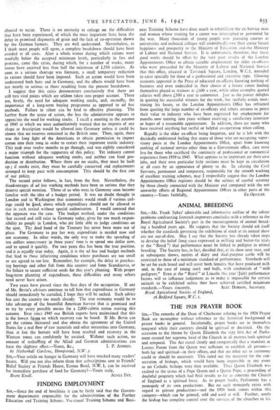FINDING EMPLOYMENT
Sta,—Since the end of hostilities it can be fairly said that the Govern- ment departments responsible for the administration of the Further Education and Training Scheme.. Vocitional Training Scheme and Busi-
ness Training Scheme have done much to rehabilitate the ex-Service man and woman whose training for a career was interrupted or prevented by the war. Many thousands of young people now pursuing courses at universities and technical colleges will undoubtedly owe their entire future happiness and prosperity to the Ministry of Education and .the Ministry of Labour and National Service. It is unfortunate, therefore, that these good works should be offset by the very poor results of the London Appointments Office to obtain suitable employment for older ex-officers who were persuaded by the Ministry of Labour and National Service that this office, situated in Tavistock Square, London, W.C.1, intended to cater specially for those of a professional and executive type. Glowing accounts appeared in the Press of educated ex-officers knowing nothing of business and even undecided in their choice of a future career finding themselves placed as trainees at £600 a year, while other examples quoted salaries well above £500 a year to commence. just as the punter delights in quoting his successful winners for the week, but tactfully avoids men- tioning his losses, so the London Appointments Office has refrained from quoting the large number of ex-officers and others anxious to prove their value to industry who have been registered for employment for months now turning into years without receiving a satisPactory interview or hopes of a reasonable appointment. In addition, there are many who have received anything but tactful or helpful co-operation when calling.
Rapidly is the older ex-officer being forgotten, and he is left with the decidedly embittered feeling that many of those who are occupying super- visory posts at the London Appointments Office, apart from knowing nothing of national service other than in a Government office, care even less for those who sacrificed the continuity of professional or commercial experience from 1939 to 1945. What appears to be important are their own jobs, and their own particular little sections must be kept in circulation at all costs by an appearance of plenty to do. In saluting the Civil Servants, permanent and temporary, responsible for the smooth working of excellent training schemes, may I respectfully suggest that the London Appointments Office registers should be the subject of careful scrutiny by those closely Connected with the Minister and compared with the not unworthy efforts of Regional Appointments Offices in other parts of the


































 Previous page
Previous page